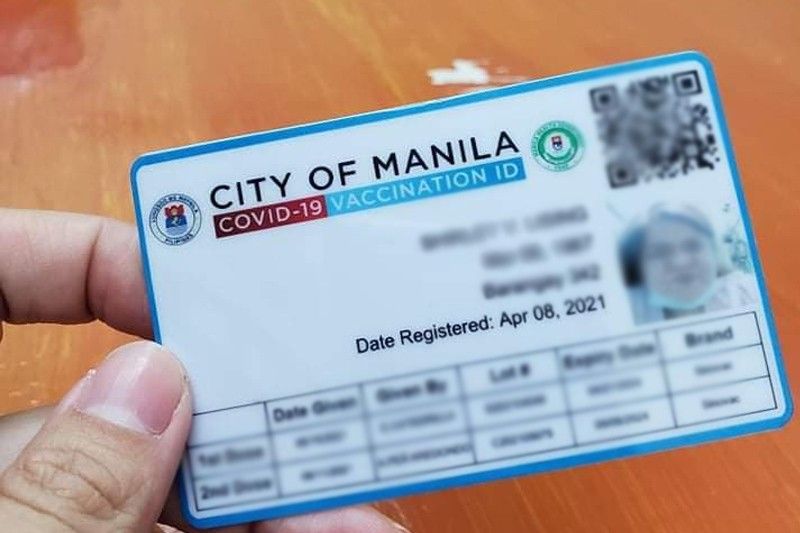Cops on lookout for fake vaccination cards

MANILA, Philippines — Police have been ordered to be alert against the possible use of fake vaccination cards now that the government has eased rules in allowing interzonal travel for fully vaccinated people, the Philippine National Police (PNP) said yesterday.
PNP chief Gen. Guillermo Eleazar, who earlier headed the government’s implementation of travel requirements nationwide as chief of the Joint Task Force COVID Shield, said police were bracing for fake vaccine cards, noting how people had been able to fake RT-PCR tests in the past.
“If the results of RT-PCR tests can be faked, it’s not completely impossible for illicit people to also use fake vaccination documents. We won’t let this happen,” Eleazar said, referring to the reverse transcription-polymerase chain reaction test to determine if a person has the coronavirus.
Eleazar said police would work closely with local government units (LGUs) in enforcing latest guidelines for interzonal travel for fully vaccinated people.
Presidential spokesman Harry Roque earlier said individuals who need to cross borders can present their vaccination cards instead of COVID-19 test results.
“I am directing all police offices and units to be vigilant against those travelers who might use fake documents to prove that they are fully vaccinated,” Eleazar said, reminding travelers to continue observing minimum public health standards.
The latest resolution of the Inter-Agency Task Force (IATF) on Emerging Infectious Diseases provides that a person is considered fully vaccinated if it has been two weeks or more since having received the second dose of a COVID-19 vaccine approved by the Food and Drug Administration or the World Health Organization for emergency use.
In compliance with the new protocols of the IATF for domestic travel, the Department of Health (DOH) said yesterday that LGUs should issue vaccination cards that are “more legitimate.”
At a press briefing, DOH Undersecretary Maria Rosario Vergeire noted that individuals fully inoculated against COVID-19 can now travel.
However, IATF Resolution No. 124-B showed they must have vaccination cards to prove that they already received two doses of the COVID-19 jabs.
“On the issue of vaccination cards, we hope and we have given advice that because of these protocols, our LGUs must improve and that they will be able to issue a vaccination card which is more legit and can be used by people when they do international travels,” she added.
Currently, however, there is no uniform design for the vaccination cards being issued by LGUs to those who received their COVID-19 jabs.
Most LGUs in Metro Manila are issuing vaccination cards on cardboard with QR codes and a space for ID pictures.
But other LGUs, especially in the provinces, are using bond paper with no space for ID picture and reproduced by photocopying machines.
Earlier, Vergeire underscored that the challenge in requiring travelers to show their inoculation cards is to validate their authenticity, especially for those issued abroad.
According to DOH Technical Advisory Group member Edsel Salvana, the old protocols apply “if vaccination cannot be properly verified.”
“It’s not a policy issue but an implementation issue. For those with verifiable vaccination cards, they should be allowed to benefit from vaccination,” said Salvana, director of University of the Philippines-National Institutes of Health’s Molecular Biology and Biotechnology.
Asked about the challenge of validating inoculation cards, he maintained this would be similar to the issue of the RT-PCR tests.
“There is no centralized repository so how do you know it’s a legitimate result? There is a presumption of regularity on the tests or vaccination cards being presented,” he added.
Salvana said “we can’t not implement because we think people will try to cheat the system because that is not fair to the ones who properly comply.”
“For those who cheat, if caught they will be punished,” he said.
Under the IATF resolution, interzonal travelers who are fully vaccinated against COVID-19 will have to present proof that they completed the inoculation, instead of swab test results.
DOT awaits go-signal
The Department of Tourism (DOT) is awaiting LGU approval of the government’s newest decision for fully vaccinated travelers to present only their vaccination cards.
The agency would still have to find out which LGU would agree to the new IATF policy, according to Tourism Secretary Bernadette Romulo-Puyat, who is also an IATF member.
Some LGUs who host the country’s tourism hotspots would ask for “a little time” as they want a majority of their population to receive their COVID-19 vaccines first before welcoming more tourists, Puyat told radio dzRH yesterday.
“For now we are trying to get who will agree… Other LGUs still have a small portion of their population vaccinated,” she said in a mix of English and Filipino.
She revealed that Benjamin Magalong, mayor of the country’s summer capital Baguio City, was open to implement the IATF resolution since 40 percent of the city’s population have been immunized against COVID-19.
Currently, some tourism destinations like Baguio City and Boracay require tourists to submit negative RT-PCR test results two days before arriving. Residents of areas under general community quarantine and the most relaxed modified GCQ can travel only to areas with the same quarantine status.
- Latest
- Trending































